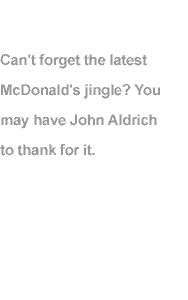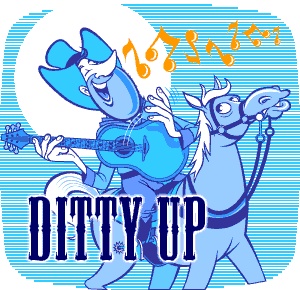 |
|
||||||||||||

|

|
|
By Michelle Sullivan
|
Some people dream all their lives of the perfect job, meticulously planning the best route down their career path -- but John Aldrich stumbled onto his. A self-taught guitarist and vocalist, Aldrich was studying composition at Boston's Berklee College of Music when a friend asked if he could write a jingle for the friend's family's business, a chain of Midwestern restaurants by the tasty name of Burger Chef. Aldrich took the assignment and came up with a pretty straightforward reason to keep on writing jingles: "I was amazed at how much I got paid for the amount of work I did," he says. Of course, you'd be naive to believe that what Aldrich does is easy. "Some musicians look down on jingle writers, but we're revered by other parts of the music community because we produce something on demand that meets a very specific set of requirements. The client decides the length, the deadline -- sometimes tomorrow -- and even gives you specific lines that you have to work into the jingle."
Aldrich's aplomb underscores the real sense behind his seemingly simple career decision. Jingle writing taps into a part of Aldrich's character that sets him apart from most people who aspire to a career in music. He can be happy and fulfilled doing work that's not driven by his own artistic vision. In fact, he likes giving his clients exactly what they want. Why a Slice of Pepperoni is Better than a Big Mac Since his fateful brush with fast food in the early 1970s, Aldrich has written thousands of jingles. He's written or sung jingles for an endless list of household names, including McDonald's, Coca-Cola, Calvin Klein, Keds, and OshKosh B'Gosh, but his bread-and-butter clients are the local companies around the country that trust him to translate their messages into song. "I'd rather do five Joe's Pizzas than one McDonald's," says Aldrich. "With a Joe's Pizza, I only have to please Joe. With a McDonald's, it's more difficult. There's a whole pyramid of approval to get through."
Aldrich's assignments come primarily from advertising agencies or recording studios -- the places business owners go when they decide they want a jingle -- and they often come with half or more of the lyrics already written. Aldrich focuses on coming up with something musical and memorable that "captures the image, the feel, the 'sell,' and all the nuances of what the client is offering." The best jingles are the ones that make listeners sing along, whether they want to or not, Aldrich explains. "If you get them to sing the name, you've got a customer." Once the music gets initial approval, Aldrich lines up a recording studio, hires musicians, arranges the music, and makes sure the finished product comes in on time and under budget. "Clients come to me and say, 'I have this much to spend. Can you do something for this much?' And I have to figure out how." The hardest part of his job, Aldrich says, is maintaining the professional relationships that lead to new assignments. He was still a student in Boston when he decided to seek out work as a jingle writer, so he concentrated on building a reputation with local advertising agencies and recording studios instead of moving to New York City, the center of the industry. "Once they know you, the agencies will call you whenever they have a job that matches up with your strengths." Though he claims to be lax in his marketing efforts, Aldrich still makes connections with new agencies and sends out demo tapes with selections of recent work that show off the breadth of his abilities. One is the Loneliest Number Performing solo is one of the toughest parts of the IP lifestyle, according to Aldrich, who worked for years with a partner. "It can be a lonely existence," he says, referring both to working on his own and to the basic challenge of jingle writing, which amounts to trying to express someone else's thoughts (the client's pitch) in a language they can't speak (music). Without a partner, the only judge of his work is the client, who can usually only say whether they like the piece or not without really understanding why it's good or bad from a musical perspective. Then there's the financial side, which includes keeping up with the music industry's never-ending stream of soon-to-be-obsolescent new equipment and making sure the project doesn't go over budget.
And those budgets have decreased over the years. "You used to get $5,000 to $8,000 for any piece. Now people think they can get anyone with a synthesizer to whip something up," he says. Though not every 15-year-old with a Casio Tonebank can be a jingle writer, the increased use of synthesizers has led to a decrease in the going rate for local jingles, now usually $1,000 to $3,000. It has also made this IP field "even lonelier," since synthesizers and computers have replaced musicians in some jingles. Aldrich counteracts this solitude by reaching out to young musicians. He introduces students to this quirky existence by teaching a course in jingle writing and another in songwriting at his alma mater, Berklee. Both courses were the first of their kind when he started teaching them, soon after starting his own career as a jingle writer. He has an important lesson to teach his students. Though Aldrich thrives on this commercial art form, jingle writing isn't for everyone. "Not all musicians can or want to write jingles," he says. "You're not out to educate, or even entertain, but to sell a product. You have to curtail your creative bug." |
||||||||||||||||
|
March 6, 2000 Primary Editor: Katy Demcak Illustrator: Steve Smallwood Production: Fletcher Moore |
We'd love to hear your comments about this article! Michelle Sullivan is the former Editor-in-Chief of Let's Go travel guides; she lives in Somerville, MA. If you like, we'd be happy to put you in touch with her, or with anyone named in this article. | ||||||||||||||||
|
| |||||||||||||||||